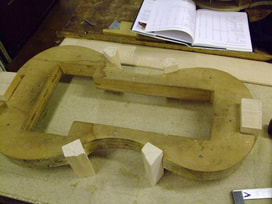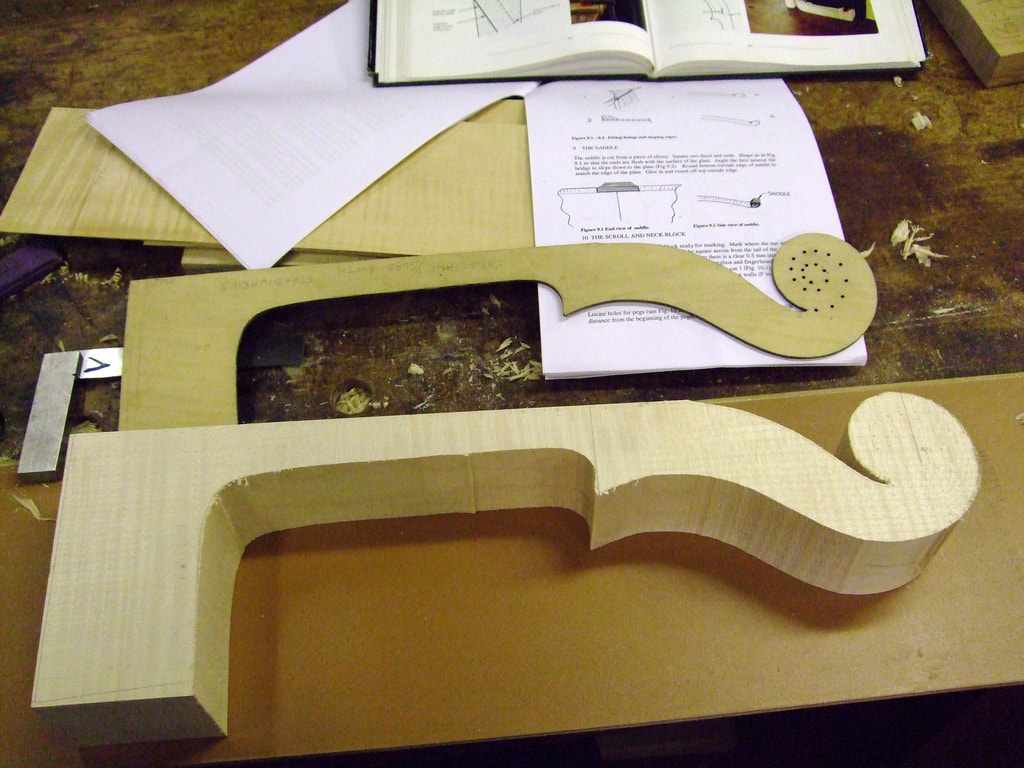Once long ago, or perhaps not so long ago, a man named Ifshin had a violin shop. Ifshin was well-known for his fine repairs of violins, violas, cellos and basses. String players from miles around came to him to have their instruments repaired.
But his real love was to make the instruments. He loved crafting from scratch, choosing the finest wood, sculpting the parts with love and care, and tailoring each instrument to its owner's individual needs. He would meet each person and talk to them, getting to know their personality and musical style, so that he could craft an instrument that fit that person and no one else. "An instrument should fit its player like a glove fits the hand," he would say.
Unfortunately, times were hard and there were few demands for hand-crafted instruments. Not even the musicians from the large orchestras had the money to pay for an instrument such as these. So Ifshin contented himself with repairs, which brought in just enough money to feed himself and his small family.
But then times became even harder. One summer, the weather was unusually cold and the crops in the Autumn were poor. People had scarce enough money to buy food and clothing, let alone to pay for repairs to musical instruments. So they continued to play their old instruments and when the instruments broke, the people put them away and worked longer hours instead. Indeed, no one was really in the mood for song and dance.
Ifshin, his wife and young son fell on hard times indeed, until one day in November he said to his wife,
"If the holiday season does not bring in more work, I will have to close the shop and seek other employment."
"But this is your passion," she answered. "You love this work. How could you give it up to take on an ordinary job?"
"My first responsibility is to my family," he replied. "If that means doing a job I do not enjoy, so be it. I must take care of you and Jacob and the new one to come." He patted his son on the head and rubbed his wife's belly.
A week passed and still no work. Then the last day of November, the bell on the shop jangled and in walked a tall gray-haired man, dressed impeccably in a fine suit.
"My name is Mr. Ma," he said. "I play first cello in the city symphony. I have heard that you are the finest repair shop in the entire region. I have traveled miles to find you and ask you a favor. My cello is lost and I need a new one very soon. I am to play in an important concert on the last night of Chanukah and need a cello as fine as the one I have lost. You are my last hope. Can you make me a cello by then?"
"I will see what I can do," Ifshin replied. He made a pot of tea and invited the man to sit awhile so that he could get to know him better. Many hours later, the cellist left and Ifshin, though the hour was late, began work on the cello. It was lucky for him that he had the right wood on hand and could begin right away crafting the instrument. As night fell, his wife came looking for him and he explained what he was doing.
"I must work night and day," he told her, "for if I can finish this instrument in time, the man will pay well and our problems will be solved for awhile anyway." Secretly, he did not see how he could make such an instrument so quickly, but he would do his best. For his family depended on it.
All that week and into the next, he worked, stopping only to quickly eat the meals his wife brought to him and to sleep a few hours. He scarcely saw his wife and young son. On the first night of Chanukah, he laid out all of the finished pieces, ready to assemble.
His wife came to him and said,
"You must take a few hours to be with us, for it is the first night and we must say the prayers." So he said the prayers and lit the candle with his family, then he ate with them and even played a bit of dreidl with his son. When his wife and son went to bed, he returned to the shop to keep working. But he was worried. It had seemed to him that his wife was not well.
Early in the morning, he went to bed and slept until dawn. He looked at his wife as she lay sleeping. No, something was not right. He called the midwife to come and then he sat with his wife, bringing her tea and wiping her face with a damp cloth.
The midwife came and said the baby was ready to come but could not. All they could do was wait and pray. So Ifshin sat all that day and night with his wife, helping as he could and taking care of their son at the same time. The halfmade cello was forgotten. The next morning, his wife seemed a bit better. So as she slept, he crept into the shop to try to finish the instrument. He stood still in wonder. For there lay the cello, already half-assembled. Had he done it in his sleep?
But Ifshin had no time to wonder, for his son was calling him. He ran back to the house to help his wife, who was hurting once more. And again he forgot the cello. For five days, he sat by his wife, again forgetting all but his family. He tended to her, took care of their son, and every night lit the Chanukah candles.
On the seventh day of Chanukah, a knock came at the door. The cellist stood there expectantly.
"I have come to see if my cello is ready," he said. "For I must have it tomorrow. The concert is in the evening and I must get to know the instrument first."
"Come out to the shop," Ifshin told the man, thinking that he would confess to him there, out of hearing of his wife and son. But when they came into the shop, the cello lay there all finished. Ifshin did not know what to think. He could not bear to disappoint the man now. "All is finished except the bow," he said. "Come back tomorrow and I will try to have it ready as well. If not, you may withhold the pay."
The cellist agreed, saying he would come early the next day. Ifshin wanted to start working on the bow right then and there, but he dared not leave his wife. Instead, he ran back to the house, where she lay groaning in pain.
It was a hard night. The midwife spent the entire night trying to get the baby to come out. And finally, just after midnight, the baby was born. She was a healthy baby after all. And Ifshin's wife, although very tired, was sure to recover, the midwife said.
Early in the morning, Ifshin took his son to the shop, stopping to give thanks for his family's health. Maybe he could still finish the bow. When he unlocked the door to the shop, his son said, "Father, listen!"
From the door of the dark shop they heard a giggling then a voice said, "We must leave now. For Ifshin will be coming in and he must not see us. Happy Chanukah!"
Then all was silent. Ifshin turned on the light. There lay the cello on his work table, along with a fine bow. The bow was strung and the cello's strings already placed.
"Who was it?" his son asked.
"I do not know, Jacob," he answered. "But they have done us a great favor. And for that, I will always be grateful."
Just then there was a knock on the door and the cellist entered. He was dressed in his concert clothes.
"Pray do you have the cello ready?" he asked. "I will take it without the bow. I can borrow a bow, but I need the cello. I must travel to the city within the hour."
"Here it is, the bow as well," Ifshin said. "I am sorry to have taken so long but all's well that ends well, no?"
"Oh thank you," the cellist exclaimed. He pressed a wad of bills into Ifshin's hands.
"Perhaps some day you can come hear the orchestra," he said. "You will be my guest. Or if you are unable to come, I will bring the cello and play for you alone."
The cellist left. Ifshin placed some coins on the table with a note. "To my helpers," it said. "With my eternal thanks." Then he and his son returned to the house.
That night, Ifshin and his family celebrated the best night of Chaunkah they had ever had. There was plenty of hearty chicken soup to strengthen his wife, latkes to fill his son's stomach, and laughter all around.
That night, after all had gone to bed, Ifshin crept once more into his shop. Again he heard voices.
"Look," one said. "He left us money."
"Well, isn't that nice," the other said. "But you know what I would really like? A violin just my size. Why should the people have all the fun? If we can make a cello, we could play one too."
"Oh yes, a violin for you and a cello for me!"
"I will do it," Ifshin called into the dark. "But I need to know more about you. Leave me a bit of yourselves and I will try to make instruments to fit you."
He heard a scrambling. "Oh no, he heard us. We must go! Wait, he said to leave something. Well, here, take off your coat. And my shoes. And our gloves. That should do it. Good-bye, Ifshin! We'll return on Purim for our reward!"
"Good bye," Ifshin replied. "And thank you, whoever you are!"
Ifshin was true to his word. He carefully crafted a little violin and cello, sized to fit the clothes he found. On Purim, he put them in his shop and the next day they were gone. He never heard from the helpers again, but it seemed to him sometimes when he worked late in his shop that he heard the music of two little instruments. Then he would smile to himself and hum along.
His wife recovered, his baby daughter grew into a fine little girl, her brother became a great helper to his father, and the shop thrived as the cellist from the city sent all of his colleagues to Ifshin.
The cellist himself became a good friend and would always come stay with the family at Chanukah, bringing his cello with him.
-MW

